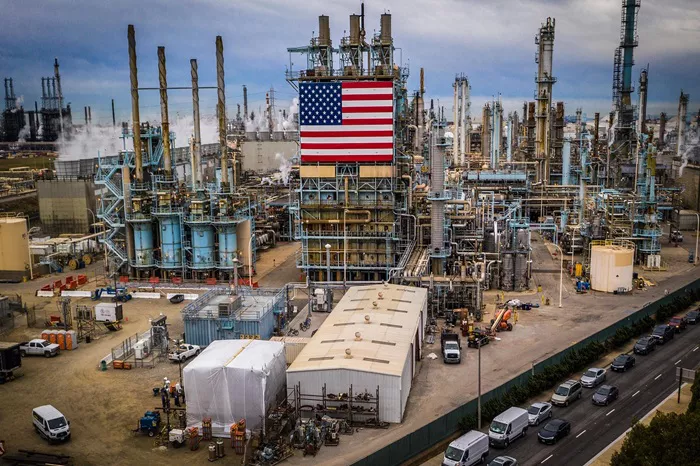The Inflation Reduction Act (IRA), often referred to as President Biden’s climate law, has garnered unexpected backing from the oil and gas industry, which many critics claim the legislation aims to undermine. As the November elections approach, major oil companies are advising Republican candidate Donald Trump to preserve the sections of the IRA that could benefit them.
Notably, Occidental Petroleum‘s CEO approached Trump at a campaign event, urging him to maintain funding for carbon capture initiatives included in the IRA. Other unlikely proponents of the legislation include ExxonMobil and Phillips 66.
Occidental is heavily invested in one of the IRA’s favored technologies: carbon capture, specifically direct air capture (DAC). The company, which has pledged to achieve net-zero emissions—including Scope 3 emissions—plans to build the nation’s largest DAC facility in Texas. While the efficacy of DAC remains debated, it is widely acknowledged that the technology is costly.
Occidental’s Texas facility is estimated to cost around $1.3 billion. The company has already secured a deal to sell carbon credits from this facility to Microsoft, allowing the tech giant to reduce its reported emissions as part of its own net-zero goals. To make the project financially viable, Occidental is looking for additional partnerships beyond IRA funding.
ExxonMobil is also investing significantly in carbon capture and hydrogen, two key areas benefiting from IRA allocations. Last year, Exxon spent $4.9 billion acquiring Denbury, a company that operates a carbon dioxide pipeline network. The supermajor has signed four contracts with businesses willing to pay for carbon capture services. According to Exxon, one recent deal with ammonia producer CF Industries could offset emissions equivalent to replacing 2 million gasoline-powered cars with electric vehicles—more than all the electric vehicles sold in the U.S. in 2023.
Chevron is similarly directing resources towards hydrogen and carbon capture, while Phillips 66 has approached Trump to discuss the IRA, intending to establish itself in the sustainable aviation fuel market. Each of these initiatives requires considerable federal financial support.
“There are elements of the IRA that the general industry says would be bad to unwind,” Phillips 66 CEO Mark Lashier stated. “Everybody is working out their contingency plans for either administration.”
While a Trump administration might appear beneficial for the oil and gas sector, it’s essential to consider the context. Such an administration would follow a Biden presidency that has pushed for regulations impacting oil and gas operations, compelling companies to diversify their investments into alternative energy sources.
Carbon capture technology is notably expensive. Occidental’s initial foray into carbon capture ended quietly, with reports revealing that a facility built 13 years ago operated at less than one-third of its intended capacity. Critics argue that the high costs associated with carbon capture hinder its viability for facilitating the energy transition, much like green hydrogen.
Sustainable aviation fuels (SAF) are also expensive to produce, costing about three times more than conventional jet fuel. The limited availability of feedstock—primarily used cooking oil—limits SAF production capacity and keeps costs high.
Ultimately, the transition to sustainable energy represents a significant financial risk, prompting even major oil companies to seek government partnership in these ventures. Once made, however, these investments cannot be easily reversed should a new administration oppose the transition.
Senator Kevin Cramer of North Dakota illustrated this complex dynamic, stating, “If we win, we need to take a scalpel, not an ax, to the IRA.” This comment underscores the reality that even Republican leaders and pro-oil states see value in transition subsidies. States like Oklahoma and South Carolina are also keen on securing their share of IRA funding, regardless of the election outcome.
Related topic:
Is Ethanol-Free Gas Better for Your Car?

